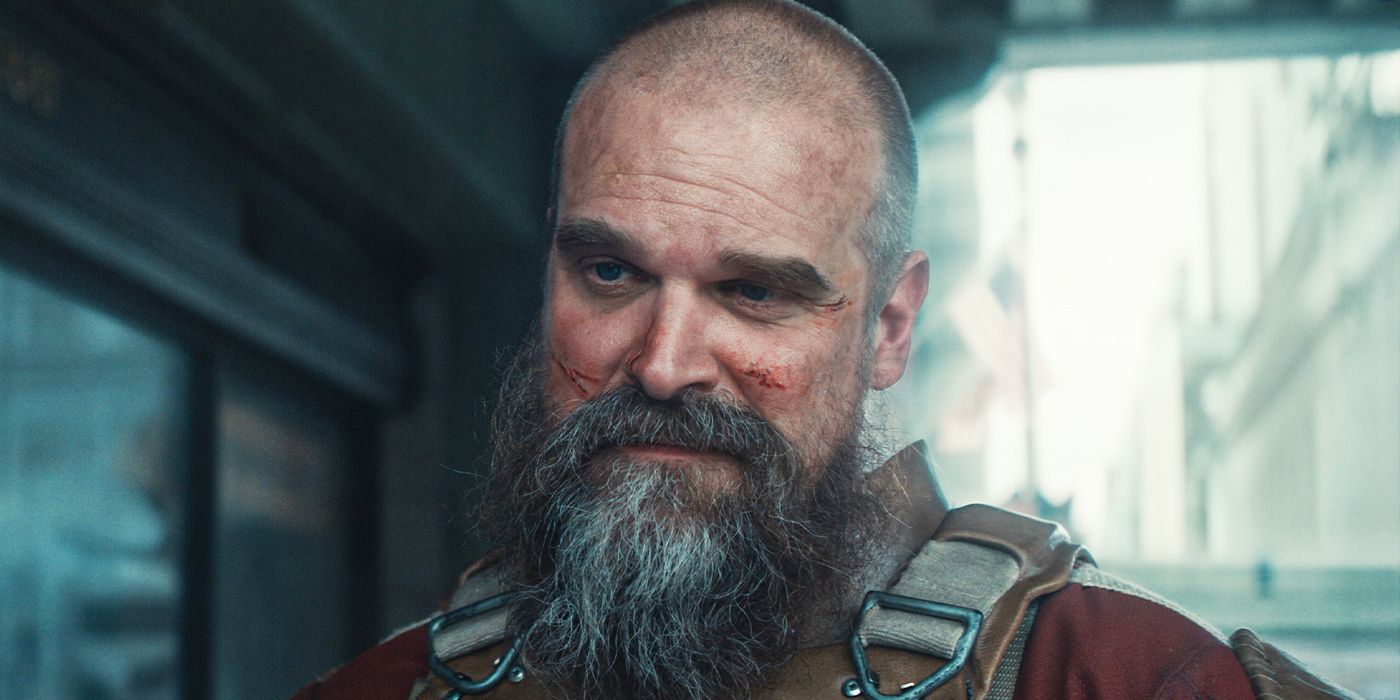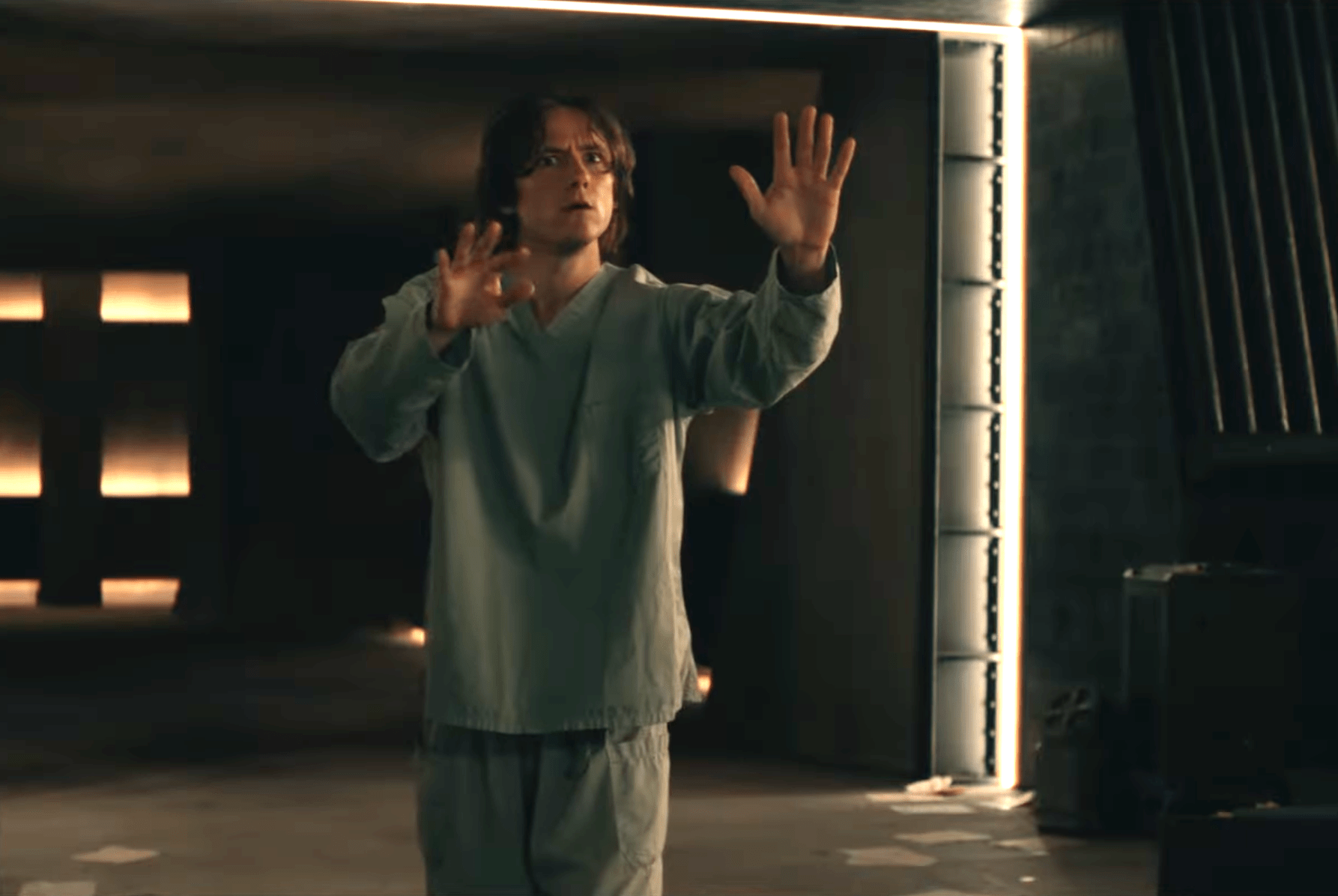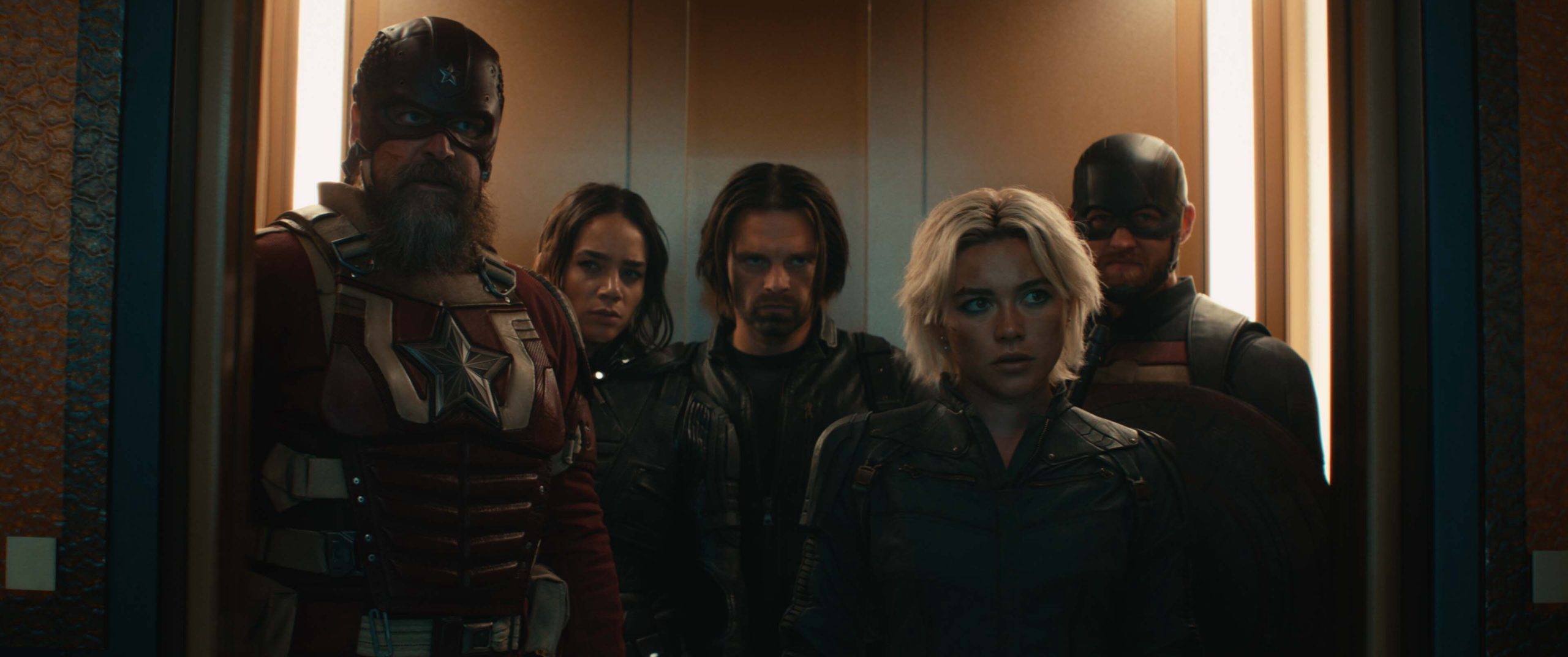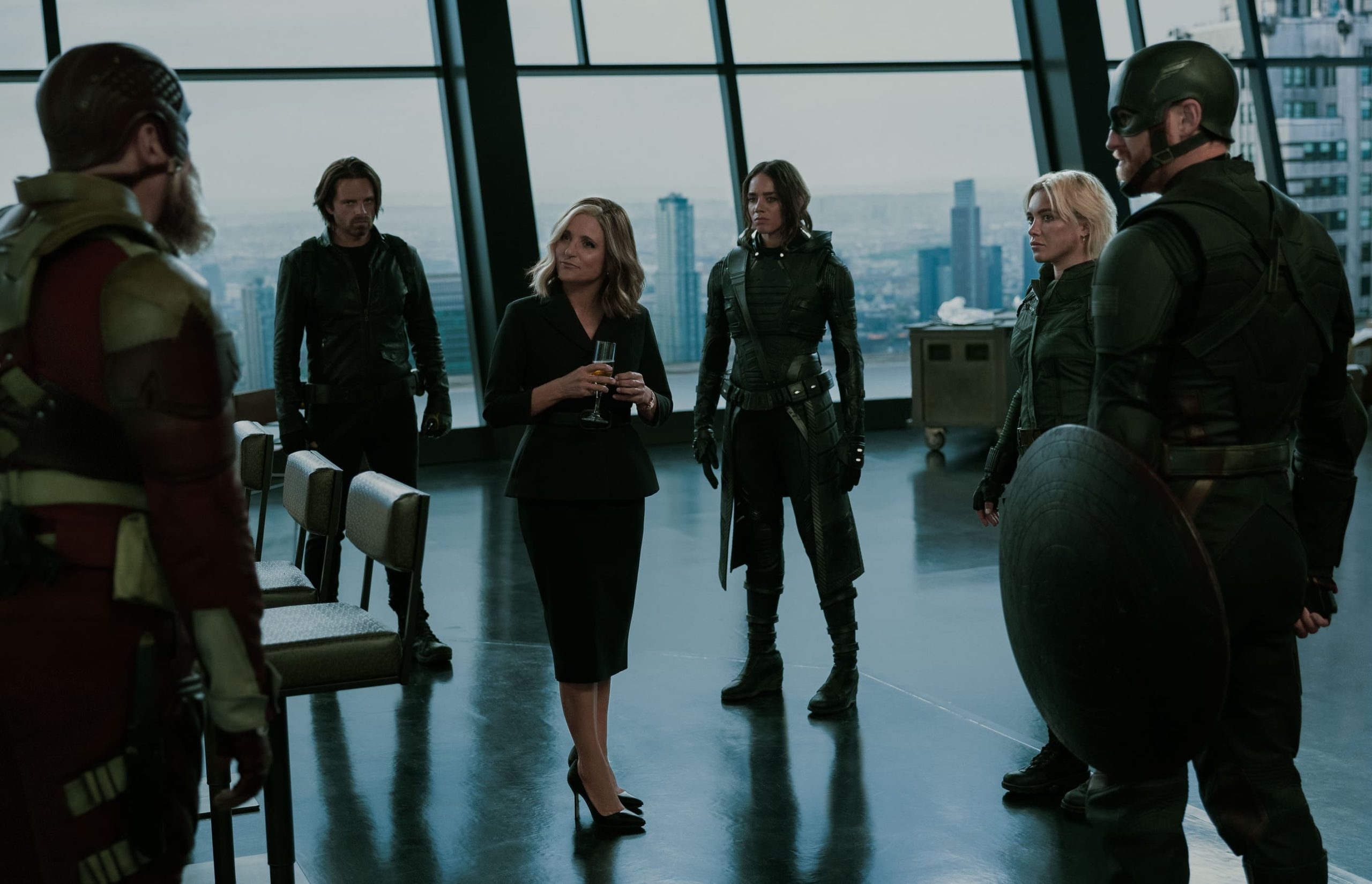Movie Review – Thunderbolts*
Principal Cast : Florence Pugh, Sebastian Stan, Wyatt Russell, Olga Kurylenko, Lewis Pullman, Geraldine Viswanathan, Chris Bauer, Wendell Pierce, David Harbour, Hannah John-Kamen, Julia Louis-Dreyfus.
Synopsis: After finding themselves ensnared in a death trap, an unconventional team of antiheroes must go on a dangerous mission that will force them to confront the darkest corners of their pasts.
********
Hip-deep into Marvel Studios’ eponymously subtitled Multiverse Saga, of which Phase Five is the cumbersome mid-section of what is now quite a bloated, listless franchise of franchises all playing in the same kitty-litter sandbox, general audiences seem to have fallen out of love with the once dominant interlocked comic-book universe that spawned a decade of box-office clout for Kevin Feige and his lieutenants. The problem for Marvel’s recent output is that the concept of a Multiverse is nigh impossible to explain to casual viewers, and often incomprehensible to all but the hardest hardcore fans, and with middling critical success for a majority of their feature films, and excessive homework to do in keeping up with the multitude of Disney+ television shows that link into it all, I think more than a few older fans might have started to drop off. Thunderbolts*, with its curious asterisk in the title, seeks to reverse the downward trajectory of the brand’s struggling narrative fortunes, and with the refurbished Fantastic Four due to drop soon (as of writing this review) there’s hope the course correction this film offers will start to steer the bulky, titanic-sized HMAS Marvel to safer, more populist waters.

Plot synopsis courtesy Wikipedia: A covert black-ops team is assembled by the enigmatic Valentina Allegra de Fontaine (Julia Louis-Dreyfus) to take on dangerous missions that operate in the moral grey zones the Avengers avoid. The squad includes Bucky Barnes, the haunted Winter Soldier (Sebastian Stan), deadly spy Yelena Belova (Florence Pugh), volatile patriot John Walker, now US Agent (Wyatt Russell), bombastic super-soldier Red Guardian, Alexei Shostakov (David Harbour), silent assassin Taskmaster, Antonia Dreykov (Olga Kurylenko), and the quantum-shifting Ava Starr, also known as Ghost (Hannah John-Kamen). Meanwhile, newcomer Bob (Lewis Pullman) joins the mission under mysterious yet consequential circumstances. As the team navigates a high-stakes global threat, their fractured loyalties and personal demons threaten to undermine the very mission they were assembled to complete.

I make no secret of my belief that since the Infinity Saga concluded with Avengers: Endgame, the Marvel Cinematic Universe just hasn’t been quite the same. Confused plot arcs, poor attempts to introduce new heroes and new teams of heroes (looking at you, Eternals), and a overabundance of content to try and keep track of, have diluted the lustre of a new Marvel film arriving in cinemas, to the point I’m actively skipping them until the next legitimate Avengers comes along. Phase Four was a complete wash with the exception of Shang-Chi, and thus far Phase Five has largely left me cold, with a few bright spots in Ms Marvel (and, surprisingly, The Marvels); heck, even the expected rock-em-sock-em nature of Sam Wilson’s Captain America was a bit of a flub. With the exception of those Marvel entries I mentioned, you’d have to go all the way back to Spider-Man: No Way Home to find a film that was a knockout success for the studio. Thunderbolts* needed to do something similar, at least setting audiences up for the heightened expectation of the arrival of the brand’s “First Family” in Fantastic Four, as well as the impending arrival of the hitherto unseen X-Men (hinted at by Ms Marvel on Disney+ a few years ago), and while I did enjoy the film in varying degrees, it’s problematic enough to maintain my ambivalence to Feige’s overall ambitions with the studio, and “placeholder”-ish to the point it quickly becomes entirely forgettable.

Similar to Brave New World, Jake Schreier’s Thunderbolts* is largely incurious about giving us the studio’s typical comic-book throwdowns, working as both a chamber piece for Florence Pugh’s emotionally fraught Yelena Belova (adoptive sister of deceased Black Widow Natasha Romanoff) and her father, Russian super-soldier Red Guardian, played with flamboyant extravagance and tongue-in-cheek humour by a winking David Harbour in full flight, and a chess-board move setup for further MCU shenanigans in the form of both Julia Louis-Dreyfus’ Valentina de Fontaine and the glimmer of reprise of having Earth’s Mightiest (remaining) Heroes at the beck and call of the United States Government. In terms of its character work Thunderbolts* does fairly well, with some interesting character interplay as the various sparring protagonists bounce insults and “personal growth” off each other for protracted lengths of the movie. The film’s writing isn’t poor, offering some nice development for Yelena and giving us some further propulsion of Sebastian Stan’s Winter Soldier character, now trying to make his way as a US Congressman for some reason, while Louis-Dreyfus seems to be having a blast as the conniving and duplicitous Val.

The film’s chief surprise is the arrival of Bob, played by Lewis Pullman, a mysterious figure whose arc turns into one of the most potentially terrifying – and ultimately unrewarding – aspects of the whole movie, moving from ally and friend through to city-dominating enemy with a considerable vendetta against his fellow man; the film ponders both intimate character beats and large-scale political schisms, not the least of which is exactly what the planet does when the OG Avengers have all gone and there’s nobody superpowered to deal with any threat. The idea of the Thunderbolts filling the gap isn’t going to make for compelling drama more than the interplay between this rag-tag band of losers and wannabes, but the filmmakers wisely utilise the fractious relationships between the “heroes” – such as they are – in a manner that makes them feel more empathetic and realistic than the uberpowered Thor or Hulk. These are ground-level heroes, pitted against a formidable (but grossly underutilised) enemy in newcomer Sentry, a villain with Superman-level powers that, sadly, isn’t the character to salvage much in the wreckage of this movie.

Thunderbolts* isn’t bad by any stretch, and Schreier’s direction is solid to a point, but he fumbles the action beats which limits just how grand and epic the movie should have been by virtue of it trying to introduce new Avengers. Val’s idea to supplant the Avengers with her own heroes, thus cementing her legacy in protecting the planet, forms the basis of the film’s throughline and although this focus wavers in the mid-section the climax of the movie, a trippy entry into the mind of Sentry’s dark side and his tragic past, is one of satisfying emotional catharsis. Even if, mind you, much of the movie never really feels like it gets out of first gear. It’s astounding that a major Marvel film would have its five main characters spend at least forty minutes of the film’s opening stanza stuck in a single interior location, something Joss Whedon or even the Russo Brothers would have desperately avoided; the sputtering pace of the film is offset by the fact that it has a lot of great humour and more than a handful of decent gags, often at the expense of Harbour’s Red Guardian, which keeps things bubbling along when it often feels like it’s spinning its wheels. I get that the scale of the film was intended to be more intimate than a wide-scale Avengers film but when shit goes down in New York City in the final act, are you telling me not a single remaining city-bound Avenger could be assed showing up? No Doctor Strange? No forgotten Peter Parker Spider-Man? No Daredevil? So much for an interconnected universe, I suppose.

As the MCU has shifted away from the original Avengers and onto supporting characters like Bucky Barnes, for example, what’s quickly becoming apparent is that Feige and his team don’t appear to have any idea on how to really develop these characters into main roles, rather than just ancillary ones. Sebastian Stan seems lost without Chris Evans’ Captain America to guide him, and his appearances post-The Falcon & The Winter Soldier have done little to assuage my concerns about how little he appears to be developing, while Florence Pugh’s Black Widow replacement in Yelena Belova feels, frankly, like a waste of her talents and our time. If they’re setting her up as some kind of defacto leader for Temu Avengers down the line I guess it works, but an actress of her calibre needs to be given more to do here than she is – Yelena’s emotional payoff in a whole film (her second full film if you count Back Widow) is nowhere near even close to the five minutes of spotty backstory we got in Whedon’s Avengers: Age of Ultron. Wyatt Russell seems to be having the most fun as subversive Captain America try-hard US Agent, and his bitter line delivery and sarcastic, caustic attitude is a perfect foil for Pugh’s more emotional center. I’m not specifically sure why Hannah John-Kamen signed up for this other than money, because her character here, reprised from the second Ant-Man movie, is utterly pointless. Hell, the secondary role of Val’s assistant, the malleable Mel (Geraldine Viswanathan) has both more lines and more character development than one of the actual Thunderbolts, which is saying how uneven the film’s focus tends to be.

Unevenly structured and bizarrely small-scale when it often strives for apocalyptic, and having the firepower to go large but firing off several dud rounds, Thunderbolts* is a vast improvement for the Multiverse Saga’s stuttering narrative success (Avengers: Doomsday needs to pay all this off somehow, and I don’t see how Feige is going to do it yet) but I have absolutely no desire, nor requirement, to revisit this one again in a hurry. As I alluded to earlier, the film feels like a placeholder for stuff to come, similarly to how Brave New World played out: there’s background stuff going on here that feels like it ought to be more prominent, and a lot of character pieces being arranged on the gameboard. I hope this isn’t the way forward for Phase Six, given this film represents the official conclusion of Phase Five, and that each film will become more impactful the way the first three Phases managed to pull off in large part. I think Thunderbolts* is yet another missed opportunity and fumble of the mandate, a secondary movie with grand ambitions that couldn’t quite elevate itself to fulfil them. Entertaining to a point, but mildly forgettable overall.


Very well presented. Every quote was awesome and thanks for sharing the content. Keep sharing and keep motivating others.
Looking forward to seeing Thunderbolts later this week.
Thank you for the review!